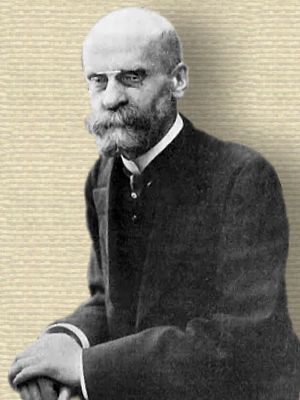 (source)
(source)
|
Émile Durkheim
(15 Apr 1858 - 15 Nov 1917)
French sociologist whose recognition as “father of sociology” rests on his important works and influence on a generation of scholars.
|
Science Quotes by Émile Durkheim (10 quotes)
A social fact is every way of acting, fixed or not, capable of exercising on the individual an external constraint; or again, every way of acting which is general throughout a given society, while at the same time existing in its own right independent of its individual manifestations.
— Émile Durkheim
The Rules of Sociological Method (1895), 8th edition, trans. Sarah A. Solovay and John M. Mueller, ed. George E. G. Catlin (1938, 1964 edition), 13.
An act cannot be defined by the end sought by the actor, for an identical system of behaviour may be adjustable to too many different ends without altering its nature.
— Émile Durkheim
Suicide: A Study in Sociology (1897), trans. J. A. Spaulding and G. Simpson (1952), 43.
Even one well-made observation will be enough in many cases, just as one well-constructed experiment often suffices for the establishment of a law.
— Émile Durkheim
The Rules of Sociological Method (1895), 8th edition, trans. Sarah A. Solovay and John M. Mueller, ed. George E. G. Catlin (1938,1964 edition), 80.
For a long time it has been known that the first systems of representations with which men have pictured to themselves the world and themselves were of religious origin. There is no religion that is not a cosmology at the same time that it is a speculation upon divine things. If philosophy and the sciences were born of religion, it is because religion began by taking the place of the sciences and philosophy.
— Émile Durkheim
The Elementary Forms of the Religious Life (1912), trans. J. W. Swain (2nd edition 1976), 9.
It is only by historical analysis that we can discover what makes up man, since it is only in the course of history that he is formed.
— Émile Durkheim
'The Dualism of Human Nature and its Social Conditions' (1914), trans. Charles Blend, in Kurt H. Wolff (ed.), Emile Durkheim, 1858-1917 (1960), 325.
Man is only a moral being because he lives in society, since morality consists in solidarity with the group, and varies according to that solidarity. Cause all social life to vanish, and moral life would vanish at the same time, having no object to cling to.
— Émile Durkheim
The Division of Labour in Society (1893), trans. W. D. Halls (1984), 331.
Science cannot describe individuals, but only types. If human societies cannot be classified, they must remain inaccessible to scientific description.
— Émile Durkheim
'Montesquieu's Contribution to the Rise of Social Science' (1892), in Montesquieu and Rousseau. Forerunners of Sociology, trans. Ralph Manheim (1960), 9.
Society is not a mere sum of individuals. Rather, the system formed by their association represents a specific reality which has its own characteristics... The group thinks, feels, and acts quite differently from the way in which its members would were they isolated. If, then, we begin with the individual, we shall be able to understand nothing of what takes place in the group.
— Émile Durkheim
The Rules of Sociological Method (1895), 8th edition, trans. Sarah A. Solovay and John M. Mueller, ed. George E. G. Catlin (1938,1964 edition), 103-4.
Sociological method as we practice it rests wholly on the basic principle that social facts must be studied as things, that is, as realities external to the individual. There is no principle for which we have received more criticism; but none is more fundamental. Indubitably for sociology to be possible, it must above all have an object all its own. It must take cognizance of a reality which is not in the domain of other sciences... there can be no sociology unless societies exist, and that societies cannot exist if there are only individuals.
— Émile Durkheim
Suicide: A Study in Sociology (1897), trans. J. A. Spaulding and G. Simpson (1952), 37-8.
The first and most fundamental rule is: Consider social facts as things.
— Émile Durkheim
The Rules of Sociological Method (1895), 8th edition, trans. Sarah A. Solovay and John M. Mueller, ed. George E. G. Catlin (1938, 1964 edition), 14.
See also:
- 15 Apr - short biography, births, deaths and events on date of Durkheim's birth.
- A Study In Sociology Reissue Edition, by Émile Durkheim, John A. Spaulding (trans.) and George Simpson (ed.). - book suggestion.







 In science it often happens that scientists say, 'You know that's a really good argument; my position is mistaken,' and then they would actually change their minds and you never hear that old view from them again. They really do it. It doesn't happen as often as it should, because scientists are human and change is sometimes painful. But it happens every day. I cannot recall the last time something like that happened in politics or religion.
(1987) --
In science it often happens that scientists say, 'You know that's a really good argument; my position is mistaken,' and then they would actually change their minds and you never hear that old view from them again. They really do it. It doesn't happen as often as it should, because scientists are human and change is sometimes painful. But it happens every day. I cannot recall the last time something like that happened in politics or religion.
(1987) -- 


